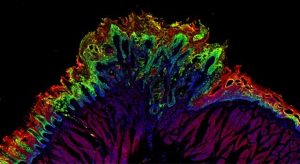Pathobiology & Translational Science
Pathobiology & Translational Science
Program Website: https://www.med.unc.edu/pathology/mcp/pbts/
Director of Graduate Studies: Andrew Gladden, PhD
Student Services Specialist: Angel Truesdale

Program Overview
Pathobiology is the study of disease (pathology), with more emphasis on the biologic rather than the medical aspects of the field. It stands at the interface between medicine (the diagnosis and treatment of disease) and biology, and therefore expands our understanding of disease processes and translates that understanding into better disease diagnosis and treatment. Because of its nature, a research-based graduate program in Pathobiology and Translational Science fits naturally into the Department of Pathology and Laboratory Medicine, and compliments the clinical divisions of the department.
The Pathobiology and Translational Science program offers outstanding graduate level training in the mechanisms of disease and translational research, leading to the Doctor of Philosophy degree in Pathology. Experimental pathologists apply methods of cellular and molecular biology to study interactions of etiologic agents with cellular macromolecules. They are interested in how these interactions lead to the expression of disease at the molecular, cellular, tissue, and organismic levels, and how this knowledge can be applied to advance patient healthcare. Training in Pathobiology and Translational Science provides the biological background and opportunity for development of basic and translational research in areas at the forefront of medicine. Our program emphasizes the inquiry into human disease processes by using a multilevel approach to research and state-of-the-art techniques. Graduates of this training program fill positions within academia, industry, and government that are concerned with human health, and the cause and prevention of human illness.
Program Objectives
The objective of the Pathobiology and Translational Science Graduate Program is to ensure that the student is a highly trained, competitive scientist capable of pursuing a productive career in basic scientific research, translational research, industrial research and development, biotechnology, governmental research and regulation, or teaching of undergraduate, graduate, medical, or allied health students. Students acquire a broad background of knowledge in the biomedical sciences, detailed knowledge of his or her research area, the ability to carry out a critical analysis of the scientific literature, the ability to pose scientific questions, the skills to seek answers in the laboratory, and the ability to present concisely his or her research in written and oral form.
Coursework
Required (total of 23 credit hours): PATH 713, PATH 714L, PATH 715, PATH 716L, PATH 723, PATH 801, BBSP 610, Elective coursework (at least 6 credit hours)*
*Students may choose courses offered by Pathology and Laboratory Medicine and/or any biomedical department, to meet their career goals and research needs.
Exams
Doctoral Written Examination
The qualifying exam in Pathobiology and Translational Science is designed to be both an educational experience and a test. It is a written examination composed of five questions designed to primarily test the student’s understanding of, and ability to apply, the scientific method to perform high quality enlightening scientific research.
Research Proposal and Oral Examination
After passing the written examination, the student prepares a NIH-style written proposal of their dissertation research project and distributes it to their dissertation committee for review. The student then meets with the committee and orally defends the proposal. This oral exam is focused on the subject matter of the proposal and questions assess the student’s command of their proposal and knowledge of the field of study.
Dissertation Defense
The student completes their dissertation research after passing the research proposal. Research is supervised by the mentor and the dissertation committee, with whom the student meets formally at least yearly during the research project. When the project is complete, the student writes a dissertation, and defends it before the dissertation committee in a public forum.
Additional Requirements
Seminar Requirements: Students present their research each year in the student seminar series. The seminar length and content is commensurate with seniority. Students also present in the department’s Annual Research Symposium. Attendance at the Department of Pathology and Laboratory Medicine’s weekly Grand Rounds is expected, and provides diverse exposure to many of the current topics in experimental, translational, and diagnostic pathology.
Teaching Requirement: Students must serve as teaching assistants in departmentally approved courses for at least one semester. This requirement is typically met during the second or third year.
